It's Time to Treat Teachers as Talent
When we think about talent, we might imagine well-known athletes and artists, trained in and uniquely masterful of their craft. Or perhaps we imagine intellectuals and subject matter experts, educated in their chosen field, equipped with foundational knowledge to put into practice, and honing valuable skills through experience.
We trust that talent like professional athletes, designers, lawyers, scientists, and architects know their craft well enough that they also have ownership over how they want to continue to grow within their respective areas of expertise.
In addition, employers understand that competitive pay is a major component of retaining talent in all industries, but that autonomy, respect, and trust often play an equally essential role.
When it comes to the world of K-12 public education, however, the system does not treat educators as talent. In fact, public school teachers in particular are vulnerable to and often experience criticism and questioning from people both within and outside of the field.
Yet, no matter their experience level, teachers are:
- Educated and trained in their field.
- Passionate about doing their jobs well.
- Eager to grow in their areas of expertise through meaningful learning.
- At their best when equipped with reliable support systems, trust, and autonomy.
- Adaptable to a work environment that’s routinely impacted by the world outside the “office.”
- Talent.
It certainly makes sense that school and district administrators, parents, and community members would be interested in the level of instruction, engagement, and student success rate at the neighborhood public school.
However, when teachers are met with scrutiny rather than support, resources, and autonomy, the risk of losing the strong and invaluable talent responsible for shaping young learners is great.
To combat this, we need to build talent development systems that support, nurture, and elevate teachers. We need to start treating teachers as talent.
RELATED: How Individualized, Competency-Based Coaching Can Elevate Teachers
Why is talent development important?
To ensure the continued growth and success of both educators and students, the team at engage2learn (what I like to call the #e2LDreamTeam) is increasingly focusing on providing the right kind of coaching, talent development, and support systems for teachers.
By integrating a comprehensive instructional coaching program into a school or district's support systems, leaders are able to enhance teachers' proficiency in competencies, instill confidence, and provide the necessary resources to help them develop the skills necessary to ensure student success.
What does treating teachers as talent look like?
The details of these efforts will look different based on local context, but overall, treating teachers as talent requires:
01: Professional Learning Competencies
Align all talent development efforts around leveled key professional competencies in order to simplify educator support, eliminate burnout, and measure growth over time.
02: Evidence-Based Coaching
Replace compliance-based, one-size-fits-all PD and observation-based feedback with a job-embedded talent development and individualized coaching model that enhances agency because it is based on evidence of practice.
03: Individualized Pathways Toward Proficiency
Expand opportunities for talent development to meet teachers’ individual needs, learning styles, and growth goals, creating personalized pathways toward proficiency in skills and competencies.
04: Advanced Educator Growth Analytics
Implement an all-in-one instructional coaching and talent development platform like GroweLab to measure educator growth and enable data-informed decision-making around talent development, empowering you to abandon initiatives or programs that neither align to competencies nor produce impactful learner outcomes.
What are the 5 pillars of talent development?
01: Culture & Strategy
How can school leaders ensure every student is receiving the school and learning experience necessary to thrive in school and in life? By intentionally designing their ideal school culture and engaging in long-term strategic planning that helps chart a course to achieve its goals for learners. We help public schools create a locally designed vision for learning that ensures the district is able to design, develop, and implement a thriving and inclusive school culture that meets the needs of every learner.
Solutions include strategic design, facilities/technology planning, learning framework design, community engagement, cultural tenet design, and implementation support.
02: Career Development
Focusing on career advancement and development ensures school districts are able to train-up their future leaders by investing in their current talent. We help public schools strategically develop compensation and incentive plans and systems that ensure educators and staff have clear and compelling career pathways while giving the district a healthy pipeline of leaders-in-development to keep the school or district on track to achieve its goals.
Solutions include teacher incentive allotment, compensation planning & systems, career pathways planning, and talent pipeline planning.
03: Coaching
Research consistently shows that ongoing, job-embedded coaching is the most effective way to ensure your teachers and staff feel more supported and confident in their positions. Our elite team of diverse and passionate educators provides evidence-based coaching that ensures your staff is developing the skills and competencies needed to be successful In fact, we can even teach your internal coaches and leaders to implement the same coaching system we have used with public schools across the country.
Solutions include GroweLab, direct teacher coaching, school improvement, train-the-trainer coaching, and leadership & principal coaching.
04: Competency Pathways
Centering talent development on core, job-specific competencies ensures your educators and staff are growing in (and actually implementing) the skills needed to achieve the unique goals and priorities of your school or district. e2L works with public schools to align professional learning to essential competency pathways developed by e2L and based on extensive research on best practices. School districts can also modify our rubrics to better align to their priority, use other state or national professional learning rubrics, or we’ll help you customize a set of standards specifically designed for your district.
Solutions include e2L professional learning rubrics, customized professional learning rubric design, and online course design.
05: Connected Data
e2L’s all-in-one instructional coaching and talent development platform, GroweLab, provides school leaders with professional growth analytics that can be correlated and connected to student and staff outcomes data to create insights that empower educators to know exactly which programs are driving improved results and which are not. With this correlated and connected data, resource-strained educators no longer have to spend valuable time and money on unproven programs, technology platforms, student data analysis, or training.
Solutions include GroweLab and advanced education analytics.
What’s at stake if we don’t start treating teachers as talent?
We can’t forget that public education is the heart of a free and thriving culture and society, which is exactly what’s at stake if we don’t commit to treating teachers as talent.
Because we know that the most powerful lever in a student’s success during a K-12 education is the teacher, the work to support and treat teachers as talent has to start today – especially in the context of a national teacher shortage. For teachers to be what students need, talent development and support systems have to be what teachers need.
Luckily, we already have the talent development systems, methodologies, and platform in place to start treating teachers as talent! And as a proud partner of hundreds of public school districts doing this work already, we know that it works.
As I always say: Everyone needs a coach. Nobody needs a critic.
RELATED: ESSA Level 3 Efficacy Study: Measuring the Impact of e2L Coaching on Reading & Math Scores



